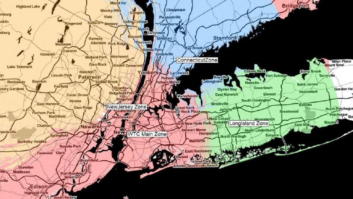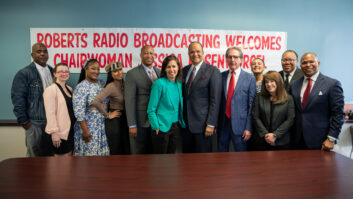GeoBroadcast Solutions has lost a formerly staunch supporter of its geotargeting FM booster proposal to the FCC.
The National Association of Black Owned Broadcasters, in a split vote by its board of directors, has pulled its support of the controversial proposal, which would permit U.S. FM broadcasters to use synchronized boosters to geotarget content for a short period each hour. Current FCC rules forbid using boosters to air different programming than is heard on the booster’s main station.
This is a notable loss for GBS, which has made support from advocates for minority broadcasters a pillar of its argument to the commission.
NABOB stated in a brief letter to the FCC: “On Oct. 27, 2022, the NABOB Board of Directors voted 6 to 4 to discontinue NABOB’s support of the proposed commission rule amendment that would permit FM boosters to transmit separate content up to three minutes per hour.”
The letter was signed by James Winston, president and CEO of NABOB. The organization represents the interests of African-American owners of radio, television and digital media in the United States. NABOB advocates to “preserve and promote African-American media ownership across the country,” according to its website.
Radio World’s emails to NABOB for further comment were not immediately returned.
Several prominent backers of the GBS proposal quickly issued a response letter questioning NABOB’s move and citing an “NAB powerplay” to disrupt the proceeding.
Scrutiny
The geo-targeting technology proposed by GBS and under consideration by the FCC has drawn immense scrutiny by the National Association of Broadcasters and large broadcast ownership groups. They say using boosters to geotarget content would cause additional interference in the FM band and upset the advertising business model of radio broadcasters.
As recently as September, NABOB was touting geotargeting technology with vigor. “Given the potential benefits to small, minority-owned broadcasters as well as small businesses and the advancement of localism, and our view that the record in this proceeding is complete, I urge the commission to adopt the proposal as soon as possible,” Winston wrote to the FCC on behalf of NABOB on Sept. 20.
At that time, he wrote: “There is broad support for the proposal among small minority owned broadcasters eager for innovative technologies and opportunities that could help them compete in today’s radio market.”
Proponents have argued that terrestrial radio broadcast is the only American media platform that lacks the ability to target messages to specific geographic audiences.
In a Sept. 8, 2022, meeting with the FCC, NABOB discounted opponents’ arguments about the risk of interference. In a meeting summary it wrote: “We emphasized that the FCC’s record is clear with actual evidence — not simply with conjecture from critics, but filled with field tests from experts — that deployment of this voluntary technology will not lead to significant interference in the FM radio service.”
NABOB had joined with groups like the National Newspaper Publishers Association (NNPA) and the Multicultural Media, Telecom and Internet Council (MMTC) to support the proposal.
On Monday, NNPA, MMTC, Roberts Broadcasting and JAM Media Solutions questioned NABOB’s sudden change of heart and said it was the result of an “NAB powerplay” to disrupt the proceeding.
“We are deeply concerned by the NABOB Board’s vote to discontinue its support for the FCC rule change that would bring geotargeting to broadcast radio. Clearly this action is yet another move in a string of savage actions NAB has taken in the interest of its largest members to destroy the advancement of new technology to an industry badly in need of expanded revenue sources,” the letter states.
The letter, signed by Dr. Benjamin Chavis Jr., president and CEO of NNPA, Steve Roberts, founder and CEO of Roberts Broadcasting Companies, Jonathon Mason, founder and CEO of JAM Media Solutions and Roberts Branson, president and CEO of MMTC, concluded: “The FCC should reject this cynical effort and keep its eye on the prize of enabling innovative technology to small and medium-sized broadcasters.”
MMTC in a separate letter said it is unfortunate that the record in the FCC proceeding has become polluted with what it called ad hominem attacks.
“As an organization of FCC ‘lifers,’ we respectfully note that these filings are irrelevant to the merits. This is not an Ashbacker hearing. Instead, this is a routine notice-and-comment rulemaking.
“The pleading climate matters. Surely investors in massive and innovative new technologies must be wondering, as they observe this docket, ‘Do we really want to spend money on businesses that must face such an ugly and time-consuming gauntlet of disparagement at the FCC?’”
The MMTC says that after 32 years of advocacy, “the minority incubator initiative has collapsed, and Congress has not summoned the will to restore the tax certificate policy. But geotargeting is a good idea that’s worth a try. All broadcasting stakeholders should join MMTC in searching for and embracing new initiatives that would diversify broadcast ownership.”
As part of the acrimonious proceeding NAB also has raised concerns about the business integrity of GBS founder and CEO Chris Devine, highlighting at least one previous business dispute that ended up in court.











